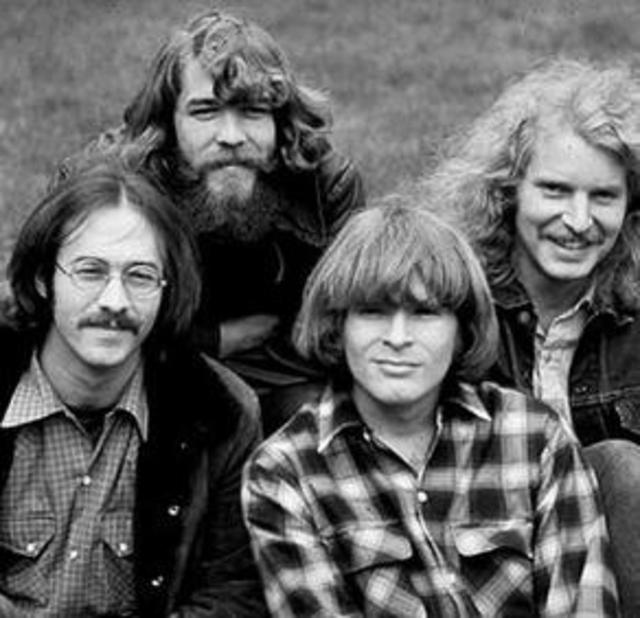Creedence Clearwater Revival

"In 1968, I always used to say that I wanted to make records they would still play on the radio in 10 years," John Fogerty, former leader of Creedence Clearwater Revival, said on the eve of the group's induction into the Rock and Roll Hall of Fame. In retrospect, Fogerty got all he wished for and more. Four decades later, Creedence's songs – including "Proud Mary," "Born on the Bayou," "Bad Moon Rising" and "Green River" – endure as timeless rock and roll classics. Under Fogerty's tutelage, Creedence Clearwater Revival defined the spirit and sound of rock and roll as authentically as any American group ever has.The origins of the group date back to 1959, when guitarist Fogerty, bassist Stu Cook and drummer Doug "Cosmo" Clifford formed the Blue Velvets, an instrumental cover band, while attending junior high in the San Francisco suburb of El Cerrito. The group played songs by such artists as Sandy Nelson, Duane Eddy, Bill Doggett and the Ventures. With the addition of John's older brother, rhythm guitarist and singer Tom Fogerty, the group played local dances and, in 1964, got signed to Fantasy Records, the region's only local label with national distribution. Unbeknownst to them, the Blue Velvets had their name changed by a label executive to the Golliwogs, a more English-sounding group handle during those heady days of the British Invasion. As the Golliwogs, they recorded seven singles that went largely unheard by the general public. In 1967, Clifford entered the Coast Guard and John Fogety joined the Army Reserves. Around this time, Fantasy re-released the last of the Golliwogs singles, "Porterville," under a new name of the band's own choosing: Creedence Clearwater Revival. With John Fogerty firmly at the helm as guitarist, singer, songwriter and producer, Creedence took off with a neo-psychedelic reworking of Dale Hawkins' rockabilly classic "Suzie Q." From then on, the hits kept coming as the band churned out six albums of powerful, roots-oriented rock and roll between 1968 and 1970: Creedence Clearwater Revival, Bayou Country, Green River, Willie and the Poorboys, Cosmo's Factory and Pendulum. It was their second album, Bayou Country, that elevated Creedence to the most popular rock band in America. Beginning with the two-sided hit "Proud Mary"/"Born on the Bayou," Creedence dominated Top 40 radio. Nine of the band's singles cracked the Top 10 during the period from 1968 to 1971, including "Bad Moon Rising," "Green River," "Fortunate Son," "Down on the Corner," "Travelin' Band," "Up Around the Bend" and "Lookin' Out My Back Door." Although the group was not overtly political, several of their songs – particularly "Fortunate Son" and "Who'll Stop the Rain" – eloquently expressed the counterculture's resistance to the Vietnam War and sympathy for those who were fighting in what now stand as anthems of those troubled times.In the early Seventies, internal problems began to pull the band apart. Tom Fogerty left in January 1971. Creedence continued on as a trio. Then, after the release of Mardi Gras in 1972, the band broke up. John Fogerty has had a long and successful solo career. Tom Fogerty also released some solo albums to less success. He died on September 6, 1990, from complications related to AIDS. And Doug Clifford and Stu Cook created Creedence Clearwater Revisited in 1995 and have continued to tour under that name.Creedence Clearwater Revival was progressive and anachronistic at the same time. An unapologetic throwback to the golden era of rock and roll, the group broke ranks with its peers on the progressive, psychedelic San Francisco scene. Creedence's approach was basic and uncompromising, holding true to the band members' working-class origins. The term "roots rock" had not yet been invented when Creedence came along, but in a real way they defined it, drawing inspiration from the likes of Little Richard, Hank Williams, Elvis Presley, Chuck Berry and the artisans of soul at Motown and Stax. In so doing, Creedence Clearwater Revival became the standard bearers and foremost celebrants of homegrown American music.Rolling Stone magazine ranked Creedence Clearwater Revival at Number 82 on its list of the 100 greatest artists of all time.